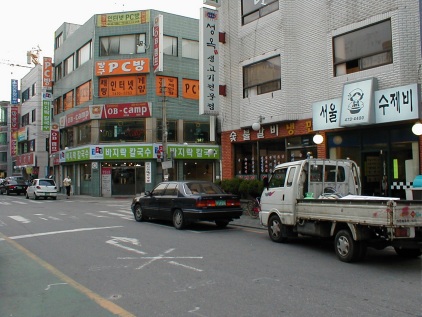Today marks twenty years since I first arrived in South Korea, knowing next to nothing about the place. My main purpose was to live abroad for a year anywhere that would pay me enough that I could then go traveling in India and Nepal. Those were the places that interested me.
Back then no one was interested in South Korea, which was almost militantly boring. People wore Western clothes, all the buildings were new and bad and dull, and what traditional culture existed was either hidden from view or presented in anesthetized form in folk villages and anemic heritage performances. As Michael Breen points out in The Koreans, the big palaces in Seoul weren’t even lighted at night, something that most countries do to show off their most significant monuments. Korea was still promoting itself mainly as a business destination: “Dynamic Korea, the Hub of Asia.” (The assistant director of the school where I taught once asked me, in all seriousness, “So, do you think Korea is dynamic?”) In 2002 Korea hosted the FIFA World Cup, a generic bid for global outreach if ever there was one.
The country was known (to the extent that it was known) for its economic miracle, transforming from a country that accepted aid from Ethiopia into a global powerhouse. But the transformation of the past two decades is almost as astonishing. At this particular moment, the Korean drama Squid Game is taking over the world on Netflix. Korean artists BTS and Lisa from Blackpink are topping global music charts. The Korean film Parasite won Best Picture at the Oscars in 2020; Minari, a Korean-language American film, was nominated in 2021. And chances are good you’re reading this on a Samsung smartphone, because Korea’s biggest company is the world’s leading maker of the signature technology of our era. Korea has become a cultural powerhouse, something you wouldn’t have predicted if you’d seen the fashions and heard the pop music back in 2001. My arrival predated the first major breakthrough of hallyu, the Korean wave: the drama Winter Sonata would take over the hearts of Japanese women in 2002.
How this all happened is a long story, but it’s notable that a lot of it was intentional at the highest levels. When I was working for the South Korean government at the UN, sometime between 2004 and 2008, a diplomat explained to me that if Korea was going to have power in the world, it would have to be soft power — cultural power. It’s not accidental that Swedish megaproducers got the visas they needed to work with Korean pop stars or that Korean dramas ended up on Iranian and Malaysian TV networks.
I remember being startled by the number of people in 2012 who wanted to talk to me about something called “Gangnam Style.” By then I’d left the Korean government job, but I was still studying Korean and even learning traditional Korean dance, so people knew I was the Korea guy. And suddenly this middling Korean pop song was getting all kinds of attention. What baffled me was that it was satire, of all things — satire of K-pop and of a certain element of Seoul society. I had no idea what this all meant to people who knew nothing about either of those things. It was as if Seinfeld suddenly shot to popularity in rural Indonesia. I still don’t really know what the Korean wave looks like to its fans. I’ve known Korea too long. I knew Korea before it was famous.
A lot has changed for me too in twenty years. That first visit was meant to be temporary, and it was, and yet here I am, with a wife and daughter and a permanent resident card in my wallet, working for that most Korean of companies on that signature product. My life was changed by an accidental encounter on my way to somewhere else. That was, in fact, how it was for most foreigners who got involved with Korea, from Hendrick Hamel to Douglas MacArthur and beyond. I’m proud to call South Korea my home, to play my small role in this latest transformation, and to be a part of raising the next generation in this extraordinary place.
Let’s see what the next twenty years brings!
Also published on Medium.

